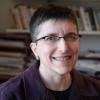
Contact Rachel
Mail Code CSI
Rachel Conrad
Franklin Patterson Hall 205
413.559.5394

Mail Code CSI
Rachel Conrad
Franklin Patterson Hall 205
413.559.5394
Rachel Conrad teaches interdisciplinary courses on critical childhood and youth studies, 20th- and 21st-century poetry of childhood, and youth-authored texts. Her courses focus on centering young people’s participation, cultural creation, and political action and activism. She holds an A.B. in English and American literature and language from Harvard University, and a Ph.D. in psychology from the University of California at Berkeley.
Professor Conrad’s scholarship integrates critical social studies of childhood and literary studies in recovering and reading youth-authored texts, as in her book on young poets, Time for Childhoods: Young Poets and Questions of Agency (University of Massachusetts Press, 2020). Together with Hampshire Professor Emerita of Literature L. Brown Kennedy, she co-edited Literary Cultures and Twentieth-Century Childhoods (Palgrave Macmillan, 2020), and she has published work on texts by contemporary young climate activists. Her current project focuses on poetry written by young African-American poets in the 1960s and 1970s. Conrad’s essays have appeared in Childhood: A Journal of Global Child Research; Children’s Literature Association Quarterly; Callaloo: Journal of African Diaspora Arts and Letters; Jeunesse: Young People, Texts, Cultures; and The Lion and the Unicorn.
Professor Conrad welcomes advising students interested in young people, children’s rights, poetry, youth-produced culture, critical children’s literature, critical approaches to psychology and education, and interdisciplinary projects across the arts, humanities, and critical social sciences.
This seminar in social and literary studies of childhood centers and explores poetry written by young people, primarily from the late twentieth-century United States. We will consider young people as cultural producers, as poets in the present, and as writers crafting their own ideas and artistry. Readings in childhood studies, literary studies, and critical literacy studies will help frame these ideas in contrast to cultural conceptions of children as cultural consumers, as potential poets in the future, and as objects of adults' pedagogical ideas. We will also explore the work of important advocates for young poets including Gwendolyn Brooks and June Jordan Keywords:Poetry, Childhood Studies, Literature, African American Literature
What would it mean for age to be understood as an axis of power and a category of sociopolitical dynamics such as gender, race, or class? How does ageism or age-related injustice intersect with other forms of injustice? How does the idea of generations inform studies of sociology, history, literature, or youth-produced culture? What do critical studies of youth and age add to our understanding of education, antiracism studies, literature, ethnic studies, history, psychology, and the arts? This course is open to students working at any stage of their Division II concentration on topics intersecting with critical approaches to youth, age, and/or generation across a broad spectrum of curricular areas including (but not limited to) the arts, education, creative writing, childhood studies, literary studies, sociology, and critical psychology. Students will formulate and pursue their own questions and projects relevant to youth, age and/or generation Keywords:Youth, Childhood, Age
Young activist Xiuhtezcatl Martinez has written that "the youth of the world are continuing to rise to power and shape our culture." In this course, we will examine texts written by youth, and youth action and activism primarily in the contemporary US, as forms of enacting such power and shaping. We will use methods from critical youth studies and literary studies to take seriously young people's social-political and cultural engagements. In focusing on young people writing and taking action for racial, environmental, and climate justice, we will consider youth-produced texts and action/activism as well as conditions that make possible youth-and-adult collaborations Keywords:youth, activism, children, childhood studies, environmental studies
This course centers Bronzeville Boys and Girls, a pivotal 1956 book of poetry for children written by Gwendolyn Brooks and reprinted with illustrations by Faith Ringgold in 2007. In this book, Brooks creates a community of child characters living in the African American community of Bronzeville in Chicago, and explores their lives, thoughts, and emotions. The book served as a forerunner of work by other African American poets and writers in the 1960s and 1970s that center young Black characters, including poet Lucille Clifton's series of Everett Anderson books and John Steptoe's picturebook Stevie. We will read these and related works and explore questions of race, representation, and young audiences; ideologies of childhood; and poetry and childhood. We will also consider questions of age, agency, and authorship given that Brooks wrote poems as a child that informed Bronzeville Boys and Girls and Steptoe created Stevie in his teen years Keywords:African-American literature, poetry, childhood studies, youth